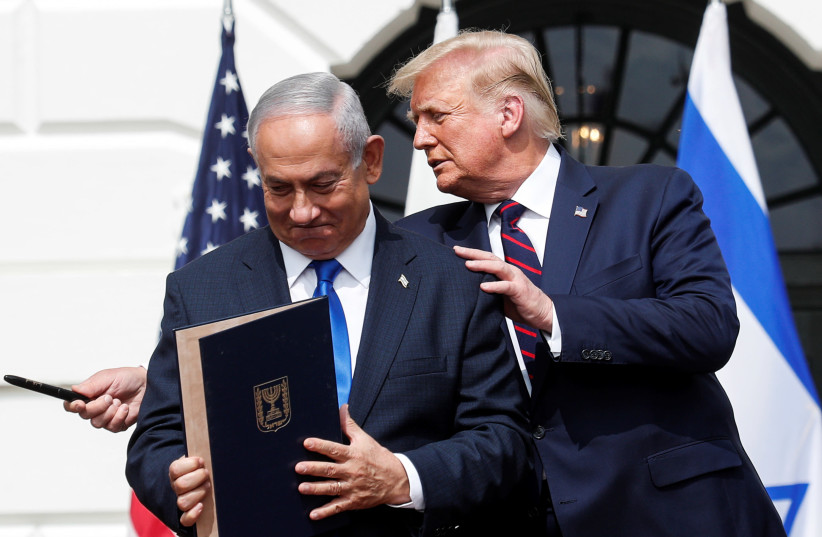Defense Minister Benny Gantz paid a historic visit to Bahrain last week, an important milestone in helping to cement the Abraham Accords. During his short, two-day trip, Gantz held meetings with the country’s king and defense minister, and also visited the US Navy’s 5th Fleet which is stationed on the island nation.
Several years ago, a high-profile visit like this would have been unimaginable. Bahrain has been at the forefront of pushing narratives of tolerance and being open to Israel, but it took the Abraham Accords and the United Arab Emirates leading the way, as well as tacit Saudi support for this process to happen.
Gantz’s visit came in the wake of President Isaac Herzog’s visit earlier in the week to the UAE and was a follow-up to his important visit to Morocco last year. As such, Gantz is showing that the Defense Ministry is revolutionizing its role in building relations abroad. This is absolutely essential in the region where defense ties play a crucial role in the face of Iranian aggression.
Gantz took part in a trilateral meeting with his Bahraini counterpart and 5th Fleet Commander Vice Adm. Brad Cooper. Cooper said “We will always be at our best when we are in a partnered effort.”
The focus of the visit, according to the Defense Ministry, was to deepen cooperation, which will enable the three countries to maintain regional stability and to defend their common interests.

US Naval Forces Central Command (NAVCENT), Is a key component of Central Command and important for protecting the sea and ensuring maritime peace. This is clear from a recent naval exercise Israel conducted with Bahrain, the UAE and NAVCENT in the Red Sea as well as the International Maritime Exercise that Israel is participating in now alongside some other 60 countries, including some with which it does not share formal diplomatic relations.
Toward this end, Gantz was joined in Bahrain by Commander of the Israeli Navy Vice Adm. David Saar Salama.
After the meetings, the delegation toured the guided-missile destroyer USS Cole. This was symbolic because the Cole was attacked off the coast of Yemen in 2000, a prelude to the 9/11attacks.
Gantz praised the emerging strategic cooperation. “The bond between Israel and the US is one based on common interests, and perhaps even more importantly on shared values. Our military cooperation is reflective of such,” he said.
The visit also comes as more drone attacks have been launched against the UAE. One of the drones was launched – and intercepted – while Herzog was visiting Abu Dhabi on Monday.
Iranian-backed proxies in the region are becoming bolder. This illustrates why Israel and the Gulf need to work closely with the US when it comes to sharing intelligence, to holding joint drills and even to sharing technology like advanced Israeli air defense systems.
What might come next? The Iranian-backed proxies feel they have impunity to attack countries in the region. They feel they can fire rockets freely at civilians in Israel and the Emirates.
Iran has trafficked weapons to Hezbollah and militias in Iraq and Syria, as well as to the Houthis in Yemen, from where the drones are launched against the UAE. While the current posture of the US and the Emirates is primarily defensive when it comes to these threats, Iran needs to be made to pay a price.
Instead, it continues to sit with world superpowers in Vienna where Iranian negotiators are not even challenged about what they are doing in Yemen.
“They don’t even say ‘Nu, nu, nu’ and are afraid to say that the Houthi attacks are being carried out by Iran,” Finance Minister Avigdor Liberman told The Jerusalem Post last week.
The visit by Gantz shows that we can all increase defense ties. The next step will be building on that through formal arrangements and defense technology sharing.
This cooperation will also show the US that it has key allies and partners in the region and that it can work and count on them. American reticence to commit more resources as it shifts to confront China and Russia is clear but Washington should not ignore what is happening in the Middle East. Iran is a threat and it needs to be confronted.
